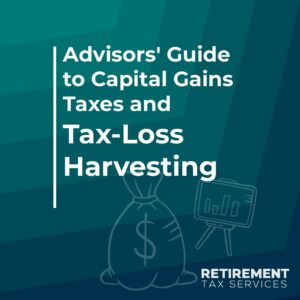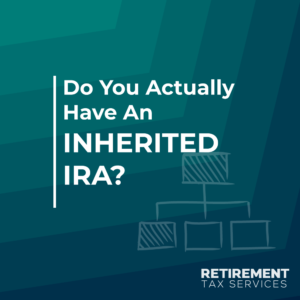“Well, the software let me do it.”
This sounds more like something you’d hear from siblings fighting than from a professional. Unfortunately, taxpayers, tax preparers, and financial advisors all have this tendency.
We all tend to put complete faith in something that’s gone through a computer. It makes sense on the surface. Computers are incredibly powerful machines (and they make such official-looking reports).
However, the reality is far less helpful. When it comes to taxes, there are several reasons why having great software isn’t enough.
Whether we are talking about tax preparation or tax planning, this applies.
This is not an attack on the software’s developers, either. There are great tools out there and all tax professionals use some combination of them.
The goal here is awareness: Software is like any other tool. To use it effectively, you need to understand both its capabilities and its limitations.
With that in mind, here are 5 reasons software should not be blindly trusted:
Reason #1 – The tax code is complicated.
Computers are built on logic and order. Sadly, the tax code is not.
One of the many challenges of creating a great piece of software is being able to handle all of the exceptions. If taxes were as simple as “I earn $1, therefore I pay $0.12 in taxes”, this article would be completely different.
Regardless, we all know that taxes are not that simple. The tax code is written by politicians, not accountants.
It is written to motivate behavior; not simply to generate revenue. For a single dollar of income there are dozens—if not hundreds—of considerations to make before deciding how much needs to be paid.
Software can assist with this complexity. That’s why its use is so prevalent. However, that same complexity should be a warning.
The user plays a vital role in ensuring a great outcome. If the software could do everything on its own, why would your clients come to you?
Reason #2 – Taxes are constantly changing.
The tax code is written in pencil. Congress can (and does) change tax laws on a regular basis.
Even if they never changed the rules again, some amounts—but of course not all—are adjusted for inflation each year. This happens at least annually, so everything has to be updated.
On top of that, the existing tax code has changes built into it. One current example of this is the Tax Cuts and Jobs Act (the provisions of which expire in 2026).
There is also great news (alongside the reasons not to implicitly trust software): changes in the tax code create planning opportunities. This is a huge opportunity for financial advisors to deliver massive value.
If we already know tax rates will go up in 2026, we can start planning now. This is the time to accelerate that income; before the change happens.
Software can help with the math, but advisors committed to tax planning will deliver the value.
Reason #3 – Every tax situation is unique.
Google is fantastic at providing facts and information. That is great news for people who spend lots of time researching, understanding and interpreting taxes. It means the information is freely available.
At the same time, it is almost worthless to individual clients. I can Google “tax planning” and get hundreds of millions of results, many of which will be helpful to my overall knowledge.
Meanwhile, Googling “tax planning for Bob and Sue” is going to produce the same generic results—but do nothing to actually help Bob and Sue.
Reason #4 – Garbage in, garbage out.
Software can work exactly as intended and still be completely wrong. At times this is user error; someone “fat fingering” a number on the way in.
It is more damaging when the forms used to gather data (like 1099s) are misleading or just incorrect.
Unfortunately, official-looking reports don’t make something automatically correct anymore than using software always makes you right.
Because of the complexity and constant changes in the tax code, tax software is made to be overwritten. In fact, tax professionals are regularly trained on how to force it to give the result they want.
This is because they and the software companies know that it has limitations.
Reason #5 – Software focuses on facts and math (not action and advice).
“So what do I do?”
That is the question that taxpayers want the answer to. However, software on its own is not going to be much help.
Taxes are not about doing simple math. Even if the software did the math right 100% of the time (and it doesn’t), your clients don’t want to know that “2+2=4.”
They want to know if there is a way for the answer to be “3” next year.
The best tools available will give you “opportunities to consider,” but these tend to be generic bullet points.
Delivering massive value on taxes is about exploring opportunities, making recommendations, and helping execute the strategy from concept to reality.
Use Software, Anyways
This article is all about why software should not be blindly trusted, yet you absolutely should use software (and we do).
Software should be looked at as a great tool. Like any device, it needs to be used as intended. It should supplement your process, but it should NOT replace your judgment.
Software can create efficiency, but quality control is still critical. The best financial advisors have an intentional process for tax planning and software is a component of that. It should never be the entire process.
Take Action
Information is only as valuable as the action we take because of it, so…
-
- Evaluate whether your software is the process or is just part of the process. Your clients are paying you for your expertise and advice. These cannot be replaced by software. It’s a great tool, but you should make it clear where you add value to the process.
-
- Get tax returns for every client, every year. Whether you use software or not, in order for your tax planning and recommendations to be accurate, they have to be based on reality.
- Continually improve your tax knowledge. The ever-changing complications of the tax code are not just challenging for software. To continually deliver value, you need resources to keep you up-to-date and educated on the best ways to serve clients. Whether that is using this website or other great resources in the industry, commit to learning.
And of course: Remember to tip your server, not the IRS!





